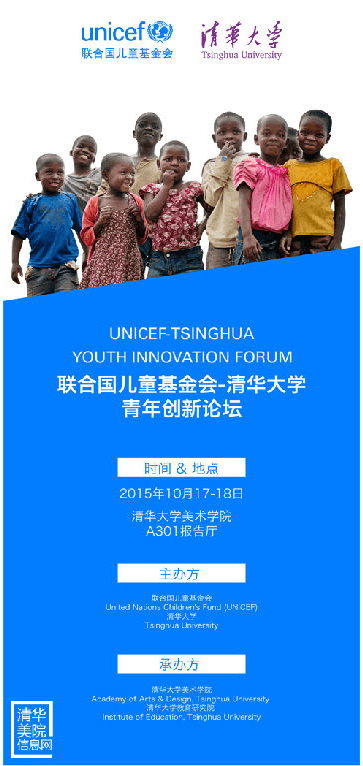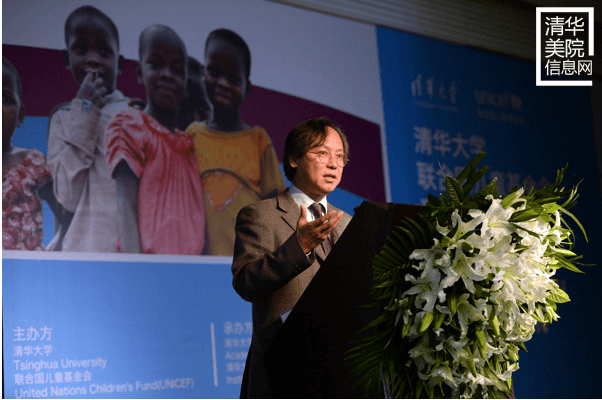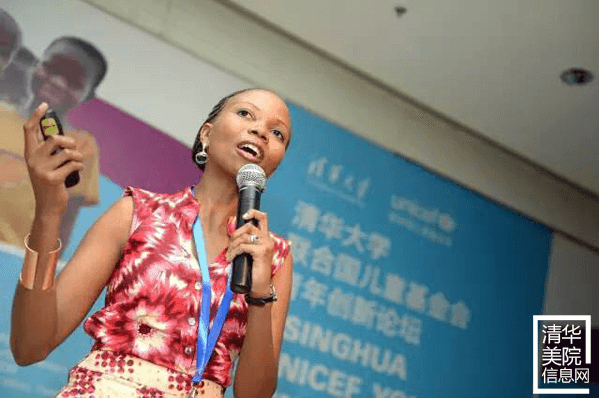
BEIJING, 17 October 2015 – The inaugural Tsinghua–UNICEF Youth Innovation Forum ignited forward-looking conversations and helped build networks between young people from China and the global South as well as private sector and development partners for responding to the needs of the world’s most disadvantaged children and contributing to global development.
Gathering at the Auditorium of Academy of Arts & Design, Tsinghua University, the two-day forum is organized by the university’s Academy of Arts & Design and the Institute of Education. It falls under a partnership between Tsinghua University and UNICEF to harness innovation for delivering services that help better meet the rights of all children, but particularly the most vulnerable and disadvantaged.
Dr. CHEN Xu, the Chair of the Tsinghua University Council, said in a video message that strengthening the Tsinghua-UNICEF partnership is an important contribution to advance the cause for women and children.
She hopes that this forum can serve as an opportunity to further advance the partnership, demonstrate both parties’ comparative advantage in realizing child rights, and jointly cultivate dedicated young people’s commitment to global and humanitarian issues. Moreover, the UNICEF-Tsinghua partnership can strive to create an open-source platform, push for people-to-people exchange, and use new science and technology findings to develop innovative products and services for the public good.
UNICEF’s Executive Director Anthony Lake said in a video message at the forum’s opening ceremony, “Children are not only at the heart of UNICEF’s work—they’re at the heart of our shared commitment to innovation.” He noted that ]young people can help address some of the problems confronting children today and that the forum was an opportunity for young people to contribute to “building a better, safer, healthier world for children everywhere through innovation,” especially as the global community turns its attention to implementing the Sustainable Development Goals.
The forum brought together more than 200 young people, designers, technologists, social entrepreneurs, academics, policymakers and industry leaders from China and the global South. They highlighted their stories of innovation and entrepreneurship and reflected on how the application of technological advancements can contribute to the post-2015 sustainable development agenda.
The opening session featured eight young innovators from China, Uganda, Nigeria, Kenya, Indonesia and Lebanon who are generating or have the potential to generate positive social impact through creative ways and who talked of their experiences. They were given the opportunity to interact with and direct questions to representatives from UNICEF and the Bill & Melinda Gates Foundation as well as leading ICT industry technology experts.
The forum also unveiled a flagship product under the Tsinghua-UNICEF partnership—the braille tablet. The tablet was designed to help blind and other visually impaired children read books, access text, audio and visual information, take notes and input their own information.

“This is just the start of a very promising partnership for the years to come,” said LU Xiaobo, Dean of Tsinghua University’s Academy of Arts and Design, which will host the Tsinghua–UNICEF Innovation Lab. “Through engaging and stimulating the brightest young talents in China, we are positive that more public goods will be created to meet the needs of the most marginalized children.”
“Innovation can be a game-changer for how we deliver results for children,” added Sharad Sapra, Director of UNICEF Global Innovation Centre. “We always marvel at how China has been transformed by adding innovation to its portfolio. By partnering with Tsinghua University, a champion for innovation in China, we hope to leverage new ideas, research and approaches to meeting the needs and rights of children, not only in China but also in the other parts of the world.”


